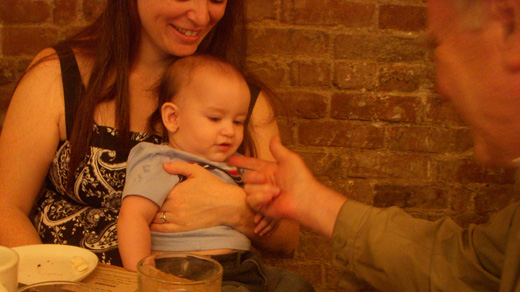Weekend Update:
Hiawatha
“Then read from the treasured volume the poem of thy choice.” Thanks to the miracle of Google — and it’s still a miracle, on this unseasonably warm evening in September of 2010 — I now know, sixty years on, that the line comes from Longfellow’s “The Day Is Done.” Although I have provided a link to the poem, I’ve never read it. I knew that Longfellow wrote it, because his name, together with his profile, was incised above it on each of a pair of bronze bookends that came down to me before I was really a reader. I don’t know when I got rid of them. They were unattractive in the way of a late Nineteenth Century beaux-arts monument’s unleavened ponderousness. For the longest time, I had no idea what the line meant. The syntax was clear enough, but the significance, wrenched from its source, remained profoundly obscure. Nobody in the 1950s would have been caught dead speaking of “treasured volumes,” reading Longfellow’s sort of poetry, using the archaic second person singular, or beginning a sentence with “then” except in exasperation. “If they don’t have pizza, then order po’ boys!”
Significant or not, the line burrowed deep into my brain, in a slightly truncated form — I lost “the poem” — and it sprang readily to mind this evening as I was looking at the bookcase that’s full of art books — massive catalogues entitled “Watteau,” “Vuillard,” “Piranesi,” “Hans Holbein,” “Versailles,” and so on. I was finishing up my spaghetti alla carbonara and thinking of hauling down a tome. And that’s what I probably would have done, if the laptop hadn’t been up and running. Leafing through Degas would be all very well, but I’m in such serious arrears on the writing front that I might be arrested for loitering with intent to malinger. Still, the possibility was sweet: “then look at the treasured volume of thy choice.” Now that I’ve glanced at a few lines of the Longfellow, I know that post-prandial art appreciation is not what the poet was thinking about. He had something more erotic in mind: the next line reads, “And lend to the rhyme of the poet/The beauty of thy voice.” In Longfellow’s day, that sort of remark was intensely sexy. You could get arrested for making such a suggestion to the wrong person.
Longfellow — will we ever? It’s difficult to imagine that Longfellow will ever be read again, not by scholars but as he was read (and beloved) over a hundred and fifty years ago, unless and until his prosody chimes in nicely with some as yet unimagined dialect of a now-sprouting language. Admirers in those future days will recall, rightly, Longfellow’s immense popularity. They will not mention how utterly uncongenial he has sounded to English-speaking ears for nearly a century.
Hiawatha. Evangeline. These epics are almost party stunts. We had to read a huge chunk of the beginning of “Evangeline” in middle school. There was a reference to the sweet breath of kine (cattle) that I found so unspeakably revolting — all right, uncool — that I was obliged to bluff my way through the rest of the assignment. Yes, here it is. “Sweet was her breath as the breath of kine that feed in the meadows.” Is that not the most disgusting thing that you have ever read? Can you imagine being asked to parse such filth at the age of eleven or twelve? When the only breath smell is that of “bad breath”?
The other day, my grandson exhaled a puff of breath in my face, and it was — not unpleasant. It was very not unpleasant. My grandson is a festival of lovely smells, but this is something that I don’t talk about, for reasons that ought to be obvious in this world of rampant perverts (or perverts rampant, to give them their due), and I wouldn’t have brought it up if I hadn’t been talking babies with Kathleen’s cousin Tim, who is the father of first-grade twins. (That’s to say that, while they’re indeed tops, they’re six.) Tim brought up the smells. Since Tim is a mensch of an accountant who lives in Indianapolis, I decided that it must not be as deranged as I thought to celebrate the smells that emanate from my grandson’s person. Breath of meadow-feeding kine should be so sweet.
I saw Will today at brunch. We picked up Kathleen’s father, who’s finally paying a visit to Our Fair City, and taxied down to Avenue B between 11th and 12th, where there’s a justly popular restaurant called “The Back 40.” If you added up all of Will’s moments of fussing from the two hours that we spent at the table, they wouldn’t amount to sixty seconds. My besottedness as a grandfather has ascended to a new plateau of foolishness: I want to run off with Will to an ashram in the Himalayas so that he can teach me the Secret of Life. That Will is in possession of this Secret I have no doubt. Or perhaps it is I who am in possession. The Secret of Life is: Grandchildren.
What will be the rhymes to which Will first adds the beauty of his voice? Probably not:
And in silence all the warriors
Broke the red stone of the quarry,
Smoothed and formed it into Peace-Pipes,
Broke the long reeds by the river,
Decked them with their brightest feathers,
And departed each one homeward,
While the Master of Life, ascending,
Through the opening of cloud-curtains,
Through the doorways of the heaven,
Vanished from before their faces,
In the smoke that rolled around him,
The Pukwana of the Peace-Pipe!
But certainly it will be sweet as the breath of kine.


And your day just got better when you blessed readers with that sixth paragraph. Of course, I will not let Ma and Pa read it.